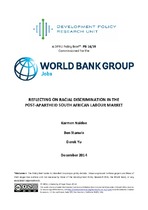| dc.contributor.author | Yu, Derek | |
| dc.contributor.author | Naidoo, Karmen | |
| dc.contributor.author | Stanwix, Ben | |
| dc.date.accessioned | 2021-03-12T08:40:35Z | |
| dc.date.available | 2021-03-12T08:40:35Z | |
| dc.date.issued | 2014 | |
| dc.identifier.citation | Yu, D. et al. (2014). Reflecting on racial discrimination in the post-apartheid South African labour market. Development Policy Research Unit, 14/39 | en_US |
| dc.identifier.uri | 10.13140/RG.2.1.5060.3760 | |
| dc.identifier.uri | http://hdl.handle.net/10566/5986 | |
| dc.description.abstract | During the 20th century, South Africa’s economy became increasingly ordered and controlled along racial lines.
Since the official demise of apartheid in 1994, the State has implemented various policies aimed at redress.
In this paper we use three sets of household surveys (1994, 2001 and 2011) to provide a picture of wage
discrimination in post-apartheid South Africa, after almost twenty years of democratic rule. Evidence suggests
that discrimination in the labour market has decreased since 1994 but unsurprisingly remains a determinant
of differential earnings between race groups. We also use a Re-centred Influence Function (RIF) approach to
decompose the impact of discrimination across the wage distribution, and we track this over time. This allows
us to make observations about the relationship between discrimination and wage levels: Discrimination
appears to decrease with higher wages, and some of the largest decreases in measured discrimination are
evident at higher wage levels | en_US |
| dc.language.iso | en | en_US |
| dc.publisher | University of Cape Town | en_US |
| dc.subject | South Africa | en_US |
| dc.subject | Racial discrimination | en_US |
| dc.subject | Post-apartheid | en_US |
| dc.subject | Labour market | en_US |
| dc.subject | Wage discrimination | en_US |
| dc.title | Reflecting on racial discrimination in the post-apartheid South African labour market | en_US |
| dc.type | Article | en_US |

